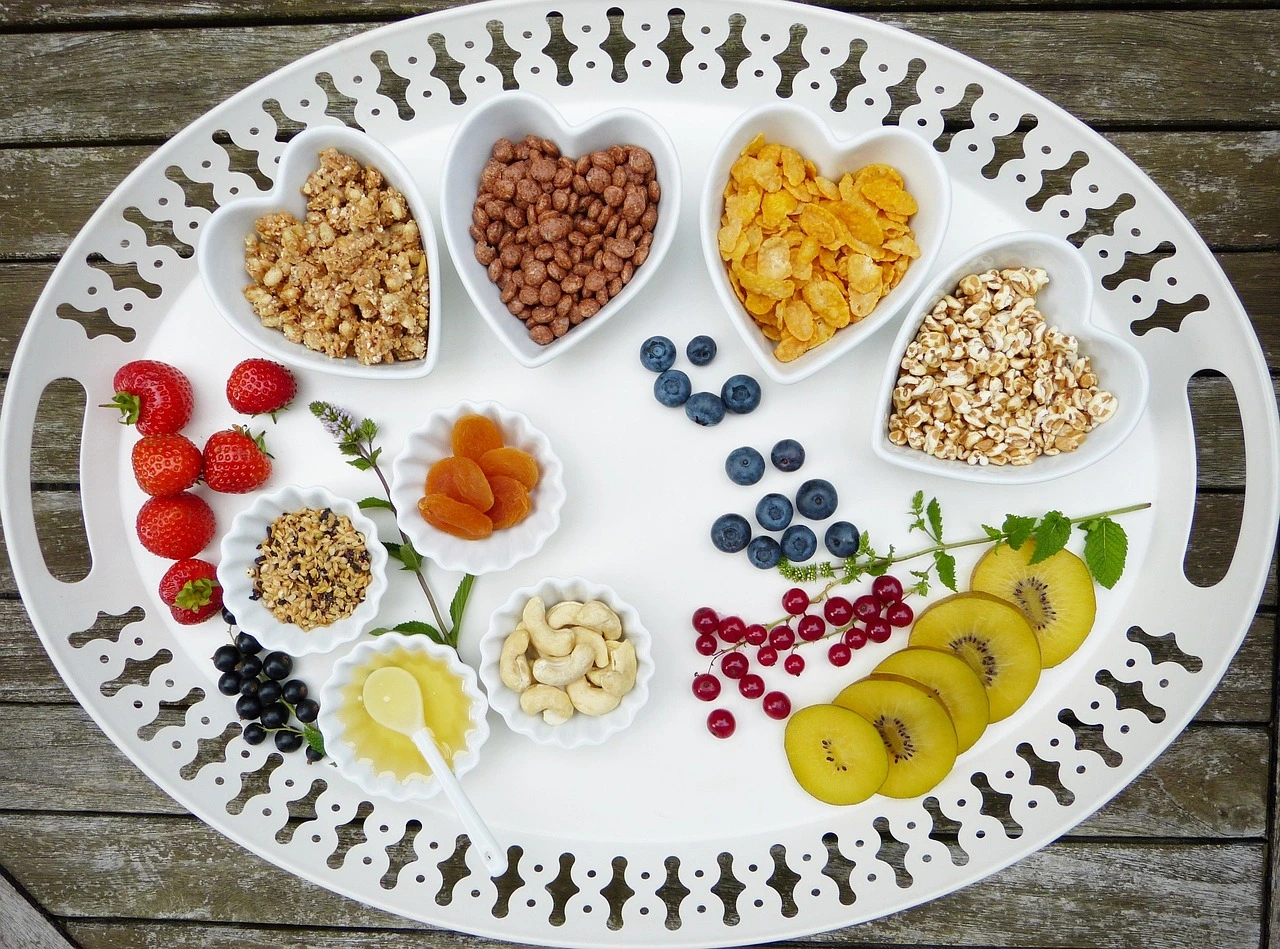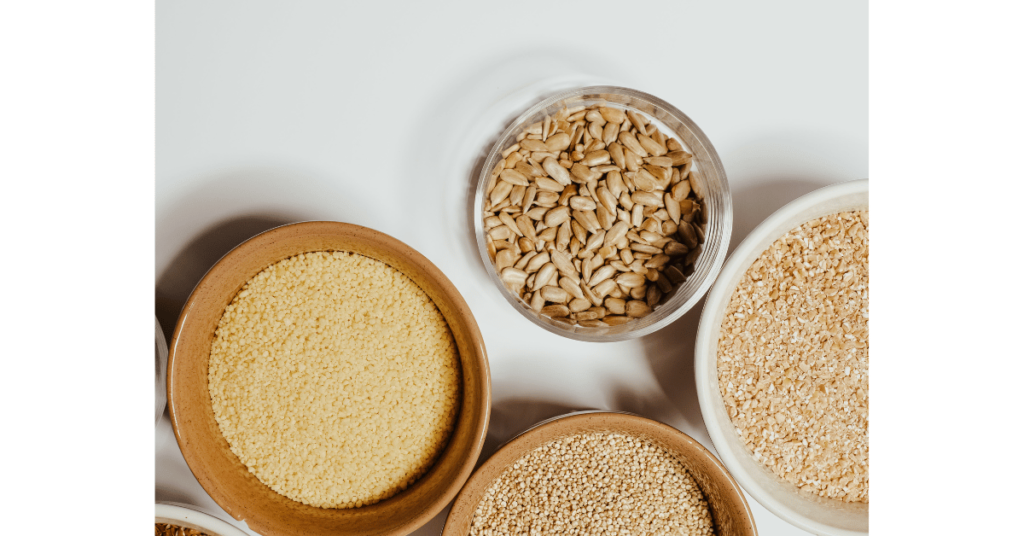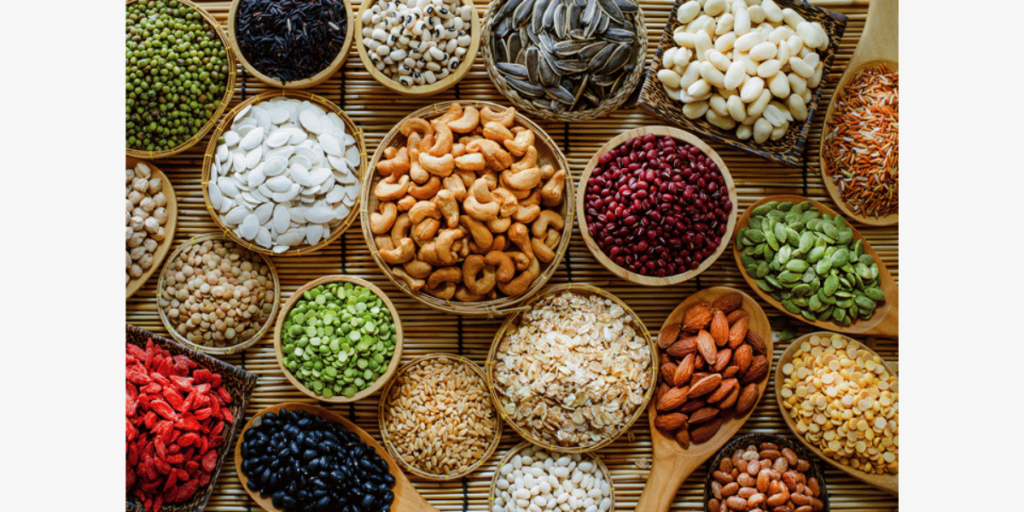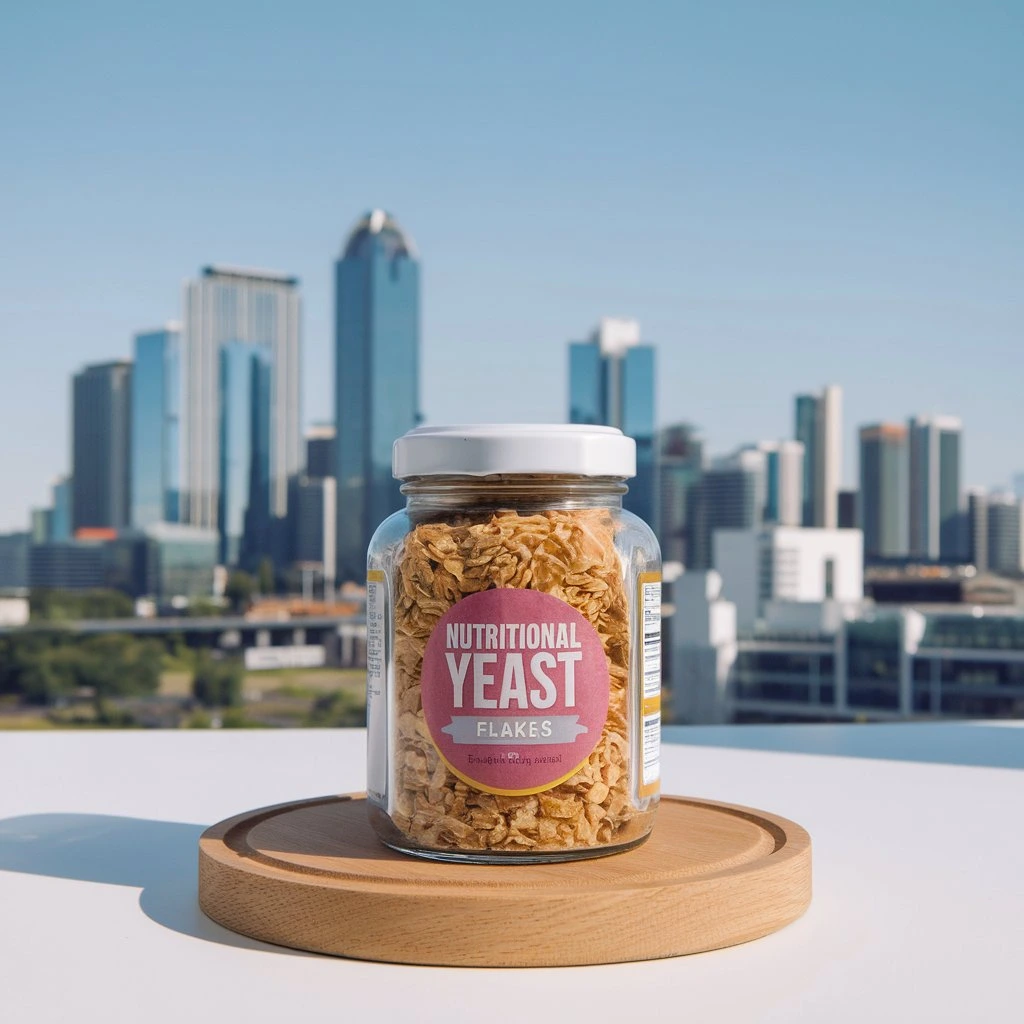The Ultimate Guide to Vegan Eating Lifestyle for Building Muscle

Here’s your ultimate guide to a vegan eating lifestyle for building muscle.
You may have heard doubts if you’re like I was at first. Some people wonder if vegans can build muscle.
Debunking the Myth: Can Vegans Build Muscle?
Absolutely!
That’s the short answer, and trust me, I’m living proof. The belief that you need animal products for strength is a myth. I’m excited to challenge this idea with my experience and learning.
In recent years, I’ve seen more people embracing the vegan lifestyle and fitness.
More people see the ethical, environmental, and health benefits of plant-based living. They also want to reach their fitness goals without compromise. This community is an excellent source of inspiration and shared knowledge for me.
Strategic Vegan Eating Lifestyle for Muscle Gain
So, how do we bridge the gap between these two worlds?
That’s where the concept of a strategic vegan eating lifestyle for muscle gain comes in.
It’s not only about eliminating animal products; it’s also about picking the right plant-based foods. You need to understand how to nourish your body for muscle growth.
This post will provide my advice on maintaining and developing muscle on a vegan diet.
Trust me, it’s not only possible but can be incredibly fulfilling!
Understanding Macronutrients: My Vegan Fueling Strategy for Muscle
First off, let’s talk about protein.
A high-protein vegan diet is key for muscle growth.
I soon realised that protein isn’t only about how much I eat; it’s also about knowing what I need. As a vegan athlete, I prioritise finding the proper daily protein intake.
Active people trying to build muscle need more protein than inactive people. I aim for a consistent daily intake rather than cramming it all in at once.
Plant-Based Protein and their Bioavailability
I know what you might think: “But what about the quality of plant-based protein?” I looked into addressing the bioavailability and completeness of plant-based proteins.
Some plant proteins may have fewer essential aminoids than animal proteins. However, I can get all the amino acids my body needs by eating various plant foods.
Combine various sources like legumes, grains, nuts, and seeds daily.
Complex Carbohydrates for Energy
Next, I rely on complex carbohydrates for energy during strenuous workouts. I realised early that my muscles wouldn’t grow without the energy to push them.
Therefore, choosing the right types of carbs for sustained energy and glycogen replenishment became a focus.
Great choices include brown rice, quinoa, oats, and sweet potatoes.They release energy steadily and help refill glycogen in my muscles after strenuous workouts, which is key for recovery and growth.
Healthy Fats
Lastly, let’s discuss Healthy Fats. They help support hormone production and nutrient absorption. These often get criticised, but they are essential for health and help build muscle. My diet always includes olive oil, seeds, almonds, and avocados.
I pay attention to the role of omega-3 and omega-6 fatty acids in muscle health. I can get omega-3s from plants like flaxseeds and walnuts, but I also consider taking an algae-based supplement. This way, I ensure I get enough EPA and DHA.
Protein steals the spotlight for muscle growth, but other macronutrients play key roles in my vegan diet.
My Favourite Top Vegan Protein Sources for Building Muscle
Legumes for Building Muscle
First, let’s discuss Legumes, The Powerhouses. These include lentils, chickpeas, and beans like black, kidney, and pinto.

Seriously, these are nutritional goldmines! They’re packed with protein and fibre, keeping me full and energised. Incorporating legumes into daily meals for consistent protein intake has become a cornerstone of my diet.
I love adding lentils to soups and stews, roasting chickpeas for a crunchy snack, and making hearty bean burgers. They’re so versatile!
Soy Superstars
Next, discuss Soy Superstars: Tofu, tempeh, edamame, and soy milk. These guys are protein powerhouses. They are complete proteins, so they have all nine essential amino acids. There are endless ways to prepare soy products for muscle-building meals!
You can scramble tofu for breakfast, stir-fry it for dinner, or blend it into smoothies. Tempeh has a fantastic chewy texture and is excellent for marinating, baking, or adding to sandwiches. And edamame?
It’s my go-to for a quick and easy protein-packed snack. Soy milk is also a convenient way to add protein to smoothies or enjoy with cereal.
Grains and Pseudo-grains with Protein Punch
Next, we have grains and pseudo-grains that pack a protein punch. This includes quinoa, oats, spelt, and amaranth. I was surprised to discover how much protein some grains contain!

Using grains for breakfast, lunch, and dinner easily adds protein, helping boost my overall intake. A whole protein, quinoa is great for salads and side dishes. Oats are my breakfast staple, and I often add nuts and seeds for an extra protein kick. Spelt and amaranth are other great options I like to incorporate for variety.
Nuts and Seeds: Calorie and Protein Dense
Don’t overlook nuts and seeds. They are packed with calories and protein. Almonds, walnuts, chia, hemp, and pumpkin seeds are great choices.

These tiny creatures are full of necessary minerals, healthy fats, and protein. Innovative snacking strategies with nuts and seeds for muscle recovery are key for me.
A few almonds after a workout or some chia seeds in my smoothie gives me a quick and healthy boost. Hemp seeds, in particular, are a complete protein and easy to sprinkle on almost anything.
Vegan Protein Powders: A Convenient Boost
When convenience matters, Vegan Protein Powders are a great help. Options like pea, soy, rice, hemp, and blends make it easy. When and how to use protein powders to meet your daily needs is something I’ve experimented with.
They’re great for recovery shakes after workouts. You can also add them to smoothies for a quick protein boost. This is especially helpful on busy days when I can’t make a complete meal.
Nutritional Yeast: More Than Just Flavour
I also discovered Nutritional Yeast: More Than Just Flavour.

This flaky, cheesy ingredient provides good protein and essential B vitamins. I love sprinkling it on pasta dishes or roasted vegetables for an extra nutritional boost.
I mainly focus on whole foods.
Meat alternatives, like seitan and other plant-based options, can be helpful. They offer protein and versatility.
Seitan is made from wheat gluten. It’s high in protein and works well in stir-fries, sandwiches, and other dishes.
I don’t always use these, but they provide a familiar texture and are a good protein source when I crave something specific.
I can easily and deliciously meet my protein needs by adding these top vegan protein sources. This helps me build and maintain muscle on my vegan journey.
Crafting My Vegan Meal Plan: Timing and Choices for Muscle Gain
Now that we’ve looked at excellent plant-based protein sources, let’s see how I use them daily.
Strategic Meal Timing
I’ve learned what I eat and when it is better for my vegan diet and muscle-building. Strategic Meal Timing has become a key component of maximising my results.
First, I pay close attention to pre-workout nutrition for energy and performance. Before the gym, I like to fuel up. I eat easy-to-digest carbs for energy and some protein to prep my muscles. Think of a banana with some almond butter, a small smoothie with oats, and a scoop of protein powder. This helps me power through my workouts and push harder.
Recovery meals are key for muscle repair and growth after a tough session. This is when my muscles are most receptive to nutrients.
I eat a meal or snack with protein and carbs within one to two hours after training. I often choose a protein shake with fruit and plant-based milk. Another favourite is a hearty bowl of lentil soup with whole-grain bread.
Sample High-Protein Vegan Meal Plan
To give you a better idea, here’s a glimpse into a Sample High-Protein Vegan Meal Plan that I often follow:
- Breakfast ideas (with protein counts):
- Overnight oats with berries, nuts, and chia seeds (15-20g protein)
- Tofu scramble with spinach and whole-wheat toast (18-22g protein)
- Lunch ideas (with protein counts):
- Large salad with chickpeas, quinoa, and roasted veggies (20-25g protein)
- Whole-grain bread on the side complements lentil soup. (18-20g protein)
- Dinner recipes (with protein counts):
- Tempeh stir-fry with brown rice and veggies (25-30g protein)
- Black bean burgers on whole-wheat buns with avocado (20-25g protein)
- Great snack choices (with protein amounts):
- A handful of almonds or walnuts (5-7g protein)
- Edamame (18g protein per cup)
- A protein shake (20-30g protein)
Ensuring Variety and Balance
Beyond hitting my protein targets, I also focus on Ensuring Variety and Balance in my diet.
Eating different colourful fruits, veggies, and whole grains helps me get the micronutrients I need. These nutrients are key for my overall health and muscle function.
Hydration is key! I drink lots of water daily, especially during workouts. It helps my muscles function and recover well.
I time my meals carefully and choose high-protein vegan foods. This helps me fuel my body for muscle growth.
Essential Micronutrients for Vegan Muscle Building
These little guys are key to energy production and muscle repair, so I always pay attention.
Vitamin B12
First up is Vitamin B12: Sources and supplementation for vegans. I and most vegans need to be mindful of this since it’s primarily found in animal products.
I rely on fortified foods, such as nutritional yeast and plant-based milk, and I also take a B12 supplement to ensure I get enough.
Nerve function and red blood cell production depend on it much. These are key for energy and performance.
Iron
Next, let’s discuss Iron: plant-based sources and enhancing absorption. Plant foods such spinach, lentils, and tofu contain iron. However, it’s a non-heme form, which isn’t absorbed as well as the heme iron found in animal products.
I mix vitamin C sources like citrus fruits or bell peppers with my iron-rich plant diets. This helps boost absorption a lot.
Calcium and Vitamin D
Then we have Calcium and Vitamin D, Which Maintain bone health alongside muscle growth. Strong bones are key when you train your body hard. I include calcium-rich foods like fortified plant milks, tofu, and leafy greens.
Vitamin D helps your body absorb calcium. It’s not found in many plant foods, and sunshine isn’t always reliable. Think about a Vitamin D supplement or fortified meals.
Omega-3 Fatty Acids
Omega-3 Fatty Acids (ALA, EPA, DHA) are also on my radar, as they are essential for reducing inflammation and muscle recovery.
I get ALA from flaxseeds and walnuts. But my body doesn’t always convert it to EPA and DHA well, which are the forms I can use more easily.
That’s why an algae-based omega-3 supplement is essential. It helps me get enough to reduce inflammation and aid muscle recovery.
Creatine
I’ve also looked into Creatine: Consider supplementation for enhanced performance. Our bodies naturally produce some creatine, which is found in animal products. For vegans wanting to boost strength and power, creatine can help. There are vegan-friendly options out there.
Zinc: Plant-Based Sources and Its Role in Muscle Repair
Finally, Zinc: Plant-based sources and their role in muscle repair is another micronutrient I pay attention to. I eat zinc-rich foods like pumpkin seeds, chickpeas, and fortified cereals. Zinc helps with immune function and repairs muscle tissue.
Being mindful of these key micronutrients helps support my body. On my vegan journey in South Africa, I thrived and built muscle.
Common Challenges and Solutions in Vegan Muscle Building
Meeting High Protein Needs
One of the first things I needed to learn was how to meet high protein needs on a vegan diet.
At first, I thought I had to be very careful. Using various top vegan protein sources from our earlier talk made things simpler.
It has been key to plan my meals and snacks and include a protein source.
Caloric Intake
I also needed to focus on Caloric Intake. It’s essential to get enough calories for muscle growth.
Plant-based foods usually have fewer calories than animal products. So, I needed to eat enough to support muscle growth.
This meant adding healthy fats from nuts, seeds, and avocados and not fearing complex carbs for lasting energy.
Amino Acid Profiling
I also thought about amino acid profiling. This means combining plant-based proteins for a complete amino acid intake.
Plant proteins may not always be “complete.” I discovered that eating different plant-based foods helps my body.
For example, when I pair grains with legumes or nuts and seeds with veggies, I get all the essential amino acids I need daily. It’s all about variety!
Digestibility of Plant Proteins
At first, I had some small digestive changes due to the extra fibre in my diet. I focused on digesting plant proteins.
Here are tips for better digestion and absorption.
Cooking legumes, soaking nuts and seeds, and adding fibre slowly helped my body adjust. Chewing my food well and staying hydrated also made a difference.
Social Situations and Eating Out
Social Situations and Eating Out: I had to learn how to navigate a vegan lifestyle in non-vegan settings. This was especially true in South Africa, where braais (barbecues) are a key part of our culture.
Planning Helps in Vegan Eating Lifestyle for Building Muscle
Researching restaurant menus is key, too. Don’t hesitate to ask for changes. Sometimes, bringing my plant-based options to gatherings helps, too! Over time, it’s become much easier as more and more places offer delicious vegan choices.
Here are some common challenges I faced and the solutions that helped me succeed on my vegan muscle-building journey.
Vegan Supplements to Support Muscle Growth
A well-planned whole-food diet is key to my vegan muscle-building. However, I’ve also found some vegan supplements helpful for muscle growth.
Think of them as the supporting cast that can provide an extra edge.
Protein Powders
Protein powders are convenient. They are great after workouts or when I need a quick protein boost on busy days.
I’ve tried different proteins, such as peas, soy, rice, and hemp. They all help me effectively reach my daily protein goals.
Creatine Monohydrate
Then there’s Creatine Monohydrate: Scientific evidence for its effectiveness in vegans. I’ve looked into the research, and it’s compelling.
Creatine boosts strength and power output. This can help you gain more muscle over time. Creatine mainly comes from animal products. So, for us vegans, taking a supplement can be very helpful.
BCAAs (Branched-Chain Amino Acids)
BCAAs (Branched-Chain Amino Acids): I’ve looked into when they can be helpful. A diet with various plant-based proteins usually has all the essential amino acids. However, I sometimes use BCAAs during tough training sessions. They help me recover better when I need an extra boost.
Vitamin B12 and Vitamin D
Vitamin B12 and Vitamin D are key supplements for many vegans. They are essential parts of my daily routine.
Getting enough of these vitamins is essential for health. They can also help muscle function and boost energy levels.
Living in South Africa, I still find Vitamin D supplements helpful. This is true, especially during the rainy months.
Omega-3 Supplements (Algae-based)
Finally, I prioritise getting enough EPA and DHA from Omega-3 supplements that are algae-based.
While I get ALA from flax and chia seeds, the conversion isn’t always optimal.
Algae-based supplements are a direct source of critical fatty acids. These acids help reduce inflammation and support well-being. This support can also aid in muscle recovery.
Supplements are just that – supplements.
A solid, nutrient-rich vegan diet works best. Regular training also helps with muscle growth
Debunking Myths About Vegan Muscle Building
One of the most common things I hear is, “But where do you get your protein?” This feeds the myth that “Vegans can’t get enough protein.”
Honestly, this couldn’t be further from the truth!
Many excellent plant-based protein sources include legumes, soy, grains, nuts, and seeds.
With some planning, I can reach my protein goals on a vegan diet. It’s not just possible; it’s tasty too.
Plant Protein is Inferior to Animal Proteinn
Another myth I often encounter is that “Plant protein is inferior to animal protein.” Plant-based proteins have different amino acid profiles. However, saying they are “lesser” for building muscle is wrong.
Daily consumption of different plant foods helps me acquire all the necessary amino acids my body requires. It’s all about the synergy of different plant-based sources working together.
Is it only meat that builds significant muscle mass?
Perhaps the most pervasive myth is, “You need meat to build significant muscle mass.”
This always makes me laugh. I think of amazing vegan athletes and bodybuilders. They show that this idea isn’t accurate.
Their strength and physique inspire me. They show me the power of a smart vegan diet for building muscle.
Recent research shows that vegan muscle gain is possible, challenging old beliefs.
Science shows that a good plant-based diet can build muscle like an omnivorous diet.
So, let’s put these myths to rest!
A vegan diet can support your muscle growth. It’s a healthy and sustainable way to meet your fitness goals.
Optimising Your Vegan Diet for Muscle Hypertrophy
For me, it’s not just about eating plant-based. It’s about adjusting my approach for the best results.
Progressive Overload in Training
I’ve learned that Progressive Overload in Training is a must. It works hand in hand with diet. Even with perfect nutrition, I must keep challenging my muscles at the gym to grow.
My diet provides the building blocks, and training signals my body to grow muscle. They truly go hand in hand.
Listening to Your Body
Secondly, listen to your body and adjust your diet based on your needs and progress. This is essential. What works for one person might not work perfectly for another, and my needs can change over time.
I pay attention to my energy levels, how I’m recovering, and the progress I’m seeing. If I’m not getting the desired results, I’m not afraid to tweak my calorie or macronutrient intake.
Tracking Your Macros
To get a clearer picture, I track my macros. I use tools to monitor protein, carbs, and fat intake. Using a food-tracking app for a week or two can help me understand my eating habits. It shows me where I might need to adjust to meet my muscle-building goals better. I don’t always do this, but it can be helpful.
The Importance of Sleep and Recovery
The need of sleep and recovery cannot be overstated. They help support muscle repair and growth. Even with all the protein, I won’t see gains without enough rest for my body to repair. Prioritising quality sleep is just as crucial as nailing my nutrition and training.
Consistency is Key
Ultimately, Consistency is Key to making the vegan eating lifestyle a sustainable habit. Building muscle takes time and dedication.
My vegan lifestyle is a lasting way to nourish my body, not just a temporary diet. This mindset helps me make steady progress and enjoy the journey.
It’s about finding a balance that works for me and sticking with it over the long haul.
Frequently Asked Questions (FAQs) About Vegan Eating for Muscle Building
First up: Is it harder to build muscle on a vegan diet?
Honestly, it doesn’t have to be. You might need to plan more to reach your protein goals with plant-based sources, but it’s doable.
Another common question is: What are the best vegan foods for muscle gain?
It’s essential to choose protein-rich foods. Legumes, tofu, tempeh, edamame, and quinoa are excellent choices. Nuts, seeds, and good vegan protein powders are also great.
People also often ask: How much protein do vegan bodybuilders need?
Depending on their training intensity and personal preferences, usually, sportsmen need 1.6 to 2.2 grams of protein for every kilogram of body weight.
Then there’s the concern: Can you get all essential amino acids from a vegan diet?
Absolutely!
Eating a variety of plant-based proteins each day helps you get all nine essential amino acids your body needs.
Finally, I often get asked: Are vegan protein powders effective for muscle building?
Yes, they definitely can be!
They provide an easy way to boost protein intake, especially after workouts. They can work as well as animal-based protein powders for muscle recovery and growth.
Here are some common questions I often hear. My experiences provide helpful answers!
Conclusion
Here you go – my journey and thoughts on thriving and building muscle while living a vegan lifestyle.
Remember, a plant-based diet won’t stop you from reaching your fitness goals. I’ve found it rewarding and sustainable. It helps nourish my body and build the strength and physique I’ve worked for.
In summary, my success with vegan eating for muscle growth comes from a few key principles. First, I know my macronutrient needs.
Second, I focus on a range of high-quality plant-based proteins. Then, I time my meals wisely. I also pay attention to essential micronutrients and tackle challenges with innovative solutions.
I’ve found that using vegan supplements can help with muscle growth. They work best when paired with a strong nutrition plan.
Debunking myths about vegan muscle-building has been empowering. It shows that plant-based diets can support athletes, backed by growing evidence.
I’ve made significant progress by optimising my vegan diet for muscle growth. I focus on consistent training, listen to my body, and prioritise recovery.
If you want to explore vegan eating while building muscle, go for it!
It’s a journey of learning and discovery, but I’ve found it incredibly fulfilling. You can thrive, build muscle, and feel great while staying true to your values.
South Africa has great fresh produce and a growing vegan community, making it an exciting time to explore veganism.
Embrace the power of plants. Stay consistent. Enjoy the road to a better, stronger, and more compassionate you!
